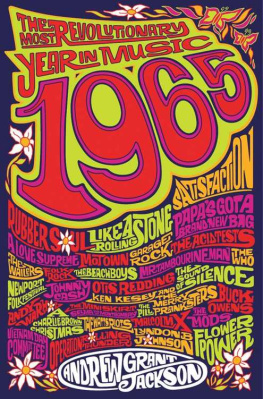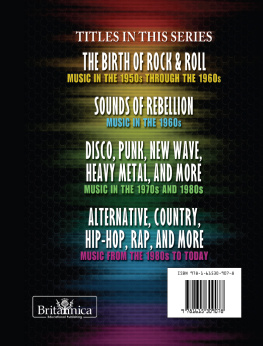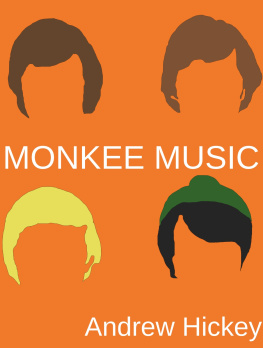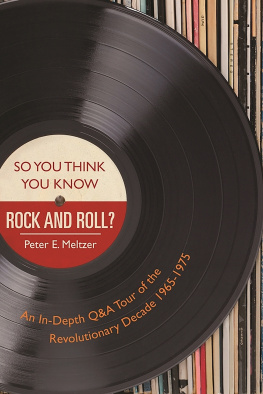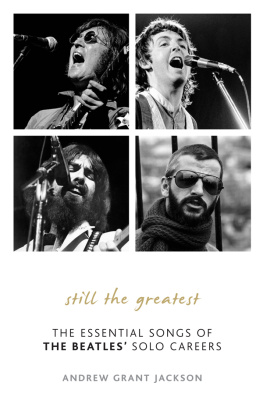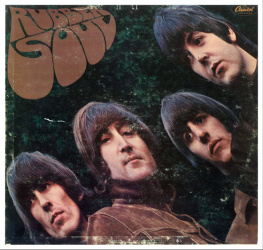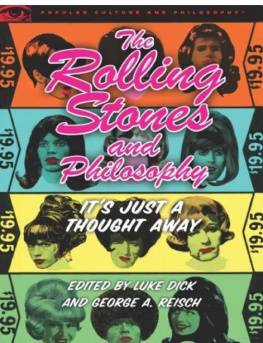Andrew Grant Jackson - 1965: The Most Revolutionary Year in Music
Here you can read online Andrew Grant Jackson - 1965: The Most Revolutionary Year in Music full text of the book (entire story) in english for free. Download pdf and epub, get meaning, cover and reviews about this ebook. year: 2015, publisher: Thomas Dunne Books, genre: Detective and thriller. Description of the work, (preface) as well as reviews are available. Best literature library LitArk.com created for fans of good reading and offers a wide selection of genres:
Romance novel
Science fiction
Adventure
Detective
Science
History
Home and family
Prose
Art
Politics
Computer
Non-fiction
Religion
Business
Children
Humor
Choose a favorite category and find really read worthwhile books. Enjoy immersion in the world of imagination, feel the emotions of the characters or learn something new for yourself, make an fascinating discovery.
- Book:1965: The Most Revolutionary Year in Music
- Author:
- Publisher:Thomas Dunne Books
- Genre:
- Year:2015
- Rating:4 / 5
- Favourites:Add to favourites
- Your mark:
1965: The Most Revolutionary Year in Music: summary, description and annotation
We offer to read an annotation, description, summary or preface (depends on what the author of the book "1965: The Most Revolutionary Year in Music" wrote himself). If you haven't found the necessary information about the book — write in the comments, we will try to find it.
During twelve unforgettable months in the middle of the turbulent Sixties, America saw the rise of innovative new sounds that would change popular music as we knew it. In 1965: The Most Revolutionary Year in Music, music historian Andrew Grant Jackson (Still the Greatest: The Essential Songs of The Beatles Solo Careers) chronicles a ground-breaking year of creativity fueled by rivalries between musicians and continents, sweeping social changes, and technological breakthroughs.
While the Beatles played Shea Stadium and made their first major artistic statement with Rubber Soul, the Rolling Stones topped the American charts for the first time with the sexually aggressive (I Cant Get No) Satisfaction, and the Who staked out their territory with the classic My Generation. Bob Dylan released his six-minute opus Like a Rolling Stone from Highway 61 Revisited and sent shock waves through the music community when he went electric at the Newport Folk Festival. Barry Maguire sang of the Eve of Destruction and Simon and Garfunkel released their first number-one hit with The Sounds of Silence.
Never before had popular music been so diverse. Soul and funk became prime forces of desegregation as James Brown scored his first Top Ten songs, the Temptations topped the charts with My Girl, and Otis Redding released the classic LP Otis Blue with his composition Respect. Meanwhile, The Righteous Brothers version of Youve Lost That Lovin Feelin became the longest song to hit number one. Country music reached new heights with the Nashville and Bakersfield sounds. John Coltrane released his jazz masterpiece A Love Supreme. Bob Marley released his first album with the Wailers. And in Northern California, the Grateful Dead gave their first performances at Ken Keseys Acid Test parties.
Jackson weaves fascinating and often surprising stories into a panoramic narrative of the seismic cultural shifts wrought by the Civil Rights Movement, feminism, Youthquake, the miniskirt, the Pill, psychedelics, and Vietnam. 1965 is a fascinating account of a defining year that produced some of the greatest songs, albums, and artists of all time.
Andrew Grant Jackson: author's other books
Who wrote 1965: The Most Revolutionary Year in Music? Find out the surname, the name of the author of the book and a list of all author's works by series.

